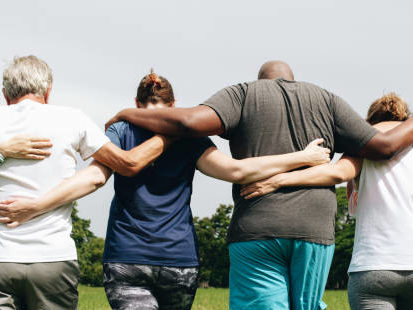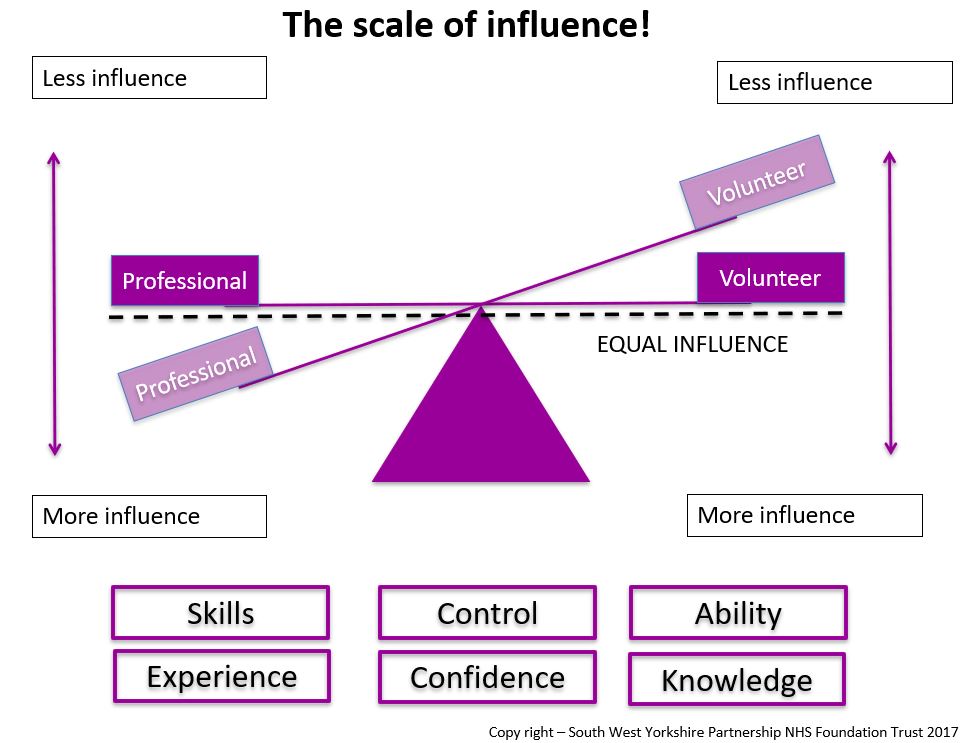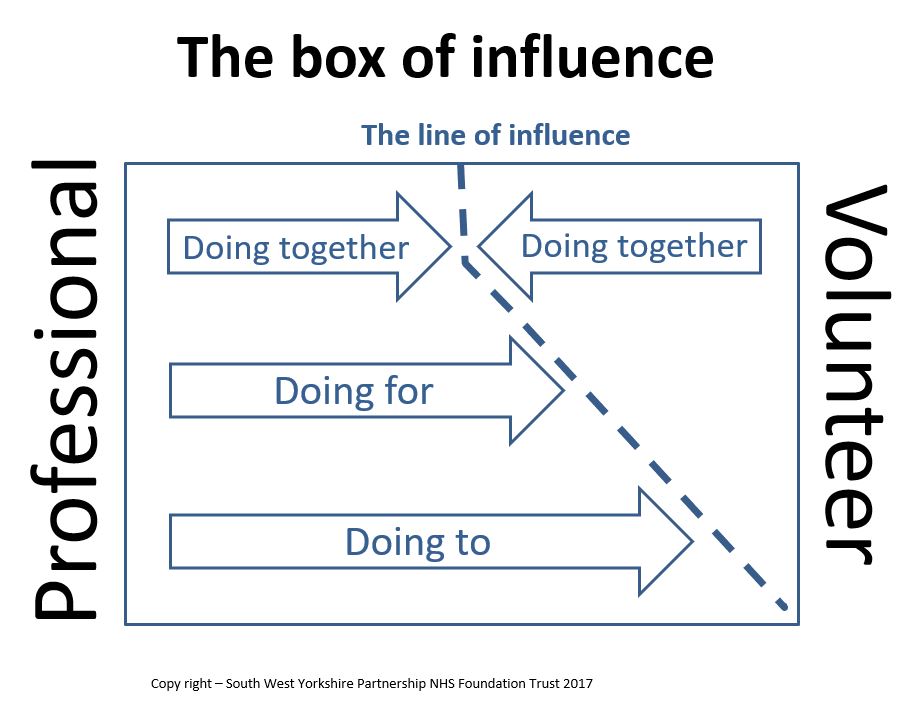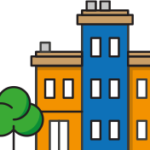Co-production in Calderdale and Kirklees Recovery and Wellbeing College

The Recovery and Wellbeing College was established in 2014. It has over 600 learners enrolled over 60% of who access Mental Health Services.
The College is led by South West Yorkshire Partnership Trust and supported by Calderdale and Kirklees Councils. It works in partnership with volunteers and other supporting organisations to develop and run a range of workshops and courses which promote wellbeing and good mental health.
It runs in a co-produced way where volunteers with a lived experience are not only actively involved in co-designing and co-facilitating courses, they also help in developing the strategic direction of the college, are a part of the governance and integral to how the college is run on a day to day basis. This has involved for example business planning, being operational group chairs and taking an active role in leading on courses and projects. We work with 30-40 volunteers 90% of whom have lived experience of mental health and of using services.
Click here for more info: https://www.calderdalekirkleesrc.nhs.uk/
Continue reading to find out what we have learnt together as volunteers and staff.
Co-production “Is a state of being not doing!”
Creating the right environment
Is there such thing as doing co-production? Can anyone say they are doing co-production 100%? Are you able to divide skills and influence on 50% expert by experience to a ratio of 50% input by expert by profession?
Is it an all or nothing thing? And if so, where do you draw the line to say you are doing it or not? And by the same logic are there degrees to it? We are 50% doing co-production!?!
Our learning in the College is that co-production starts with a shared value base which we strive towards and forever try to reach. We believe lived experience matters; we are better when we collaborate and learn from each other.
Creating the right environment is crucial for co-production to happen. Here are some key points to consider.
Coproduction take times to grow and develop
Finding the right balance of people takes time. Consideration of experiences, skills and knowledge across the professional and lived experience domains is not something you can click you fingers at and it just happens. You have to search people out, create opportunities for people to take part in, encourage others to give it a go. Often you start with who you have and entice others to join in. You also need to consider the skills people with a lived experience need to take up positions of influence if they are to co-produce with professionals.
There is a need to be clear on the task, what its objectives are, timescales and the necessary skills, experience and knowledge to complete it. All those involved, must have a clear role that’s understood by all with equal power and say.
The scale of influence looks at what all parties involved need to consider. To influence you need knowledge, you need confidence, you need experience, you need to know your contribution will make a difference. Imagine these attributes as weights on a scale. See how these weights can affect the balance of influence towards co-production.

To achieve equal influence resources such as training, accessible meeting spaces and IT will be required
Everyone has a valuable contribution to make!
There is a difference between being listened too and being heard. It is important to treat each contribution with curiosity to find meaning to it. Everyone is a contributor and has some insights that can be crucial to success. Professionals often make the mistake of sitting out on discussions in reverence to the idea of co-production. Remember professionals also have insights and coproduction means they need to join in as well, but it also means hearing and responding with positive action to other valuable contributions!
Relationships matter and need investment
We meet each week at what we call a huddle. We value each person and take time to check in with everyone. We include staff in the same way. Why is this important? We recognise that people don’t just bring with them their skills but themselves. By allowing a space to check in we are acknowledging how everyone is and valuing them and their contribution.
Our best ideas come from these huddles. We keep the agenda to a minimum and allow conversations to flow. It may sound chaotic and ad hoc but it works. Part of allowing this as a free space for discussion evens out the playing field between professionals who order their work and people with a lived experience who may want space to be heard about something important, they need to say and needs to be heard!
Our volunteers are part of the team
This may sound obvious, but it means more than including or engaging them. We recognise volunteers as having additional skills and insights. These insights may relate to their experiences as people that have used services and/or as learners in our college.
Many have skills not associated with illness or disability but past occupations including teaching, managing, creative industries as well as having personal attributes and skills. The value we hold onto is that everyone has something of value to offer and these add to the whole or to our collective brilliance.
Collectively we have more intelligence and skills than separately. It is therefore a collaborative, strengths-based team approach.
We are collectors of brilliance and valuable insights
Being part of the team means sharing power and taking responsibility
We share tasks, problems and work within limitations. We constantly learn – but that is an attitude! We can’t and won’t learn unless we stay humble and are open to constructive feedback. Our mistakes are shared as learning opportunities and we take collective responsibility.
We adopt the stance of being curious taking the time to explore the experiences our learners have. Volunteers offer unique insights into how anxiety for example may affect them and so we can make simple adjustments to the way we work.
Feedback comes more readily, and we adapt more adeptly as we are not reliant on lengthier processes such as questionnaires or survey to make changes. Our college is therefore a friendly welcoming and safe place because of this approach.
We all need to make adjustments in our thinking to support co-production
The box of influence (see below). This illustrates the adjustments that both professionals and people with a lived experience need to make. Both need encouragement to shift out of their natural zones. Professionals need help in sharing influence and control and people with a lived experience often need encouragement to take it.
Past experiences can hinder this. The box of influence helps understand the misperceptions and misunderstandings of co-production and the barriers of experience and expectation that sit alongside it.

It can be hard for people with a lived experience to take up power. Many become used to being more apathetic and reliant on professionals due to past interventions and expectations. Co-production can be challenging for professionals who need to rely less on their professional status and interventions and create something new in collaboration.
Co-production is organic – it grows out of mutual respect and mutual value to everyone’s contribution. It works by an acknowledgment of equal power and agency. Status holds little value, contribution holds more! It is asset based and driven by looking at what we can do rather than what we can’t. It is also messy, and we accept we don’t always get it right, but the point is that we constantly try! Like any ingredient that goes into a cake, it is all to easy to get the amounts wrong but through trial, error and correction a perfect cake is possible. The ingredients to co-production are described above. Start introducing the values into your work and being honest with your progress. Creating the right environment takes time for co-production to happen but so does heating up the oven to bake a cake!
Now you have read our learning about creating the right environment here are some other things to consider about using volunteers.
Working with volunteers is not a cheap option.
It takes investment of time, money, and commitment. Volunteers need clear ‘role descriptions’ with objectives so that everyone is clear what they are there to do, with clear parameters and training plan.
Communication is key with volunteers who are often outside of the organisation’s information/communication loop. It is important that communication is adapted to be relevant and overly corporate approaches challenged. It is all too easy for volunteers to feel like commodities rather than valued members of the team.
Celebrating success and saying thank you are key. It helps provide recognition, boost confidence and keeps volunteers engaged and feeling valued. We send thank you cards out on a regular basis, we celebrate birthdays. The small touches really matter!
You need to establish clear training and development opportunities and think about matching this into progression routes and pathways such as Peer Worker training and vocational skills.
Sara’s story…
Almost three years ago I moved from Sussex up to Yorkshire. The move was a huge strain on my mental health, as I have bipolar, so it was to be expected. I was referred to mental health services but also looked at other ways to support my mental wellbeing. I had accessed the Recovery College in Brighton and so connected with the Recovery College in Calderdale, Halifax. My anxiety made it very difficult for me to attend initially. Having been referred to the vocational service my support worker was able to initially support me to the College courses. Gradually I became more comfortable and was able to attend the college by myself. The staff were very welcoming and encouraging and slowly my confidence increased. A staff member “Rachel” must have seen something in me that I couldn’t see myself and encouraged me to volunteer and whilst it took a while, I finally found the strength!
Initially I attended creative courses as a volunteer support adviser and offered small insights from a lived experience perspective. As my confidence increased my involvement also increased and I started co-facilitating. Then the tutor on one course I was co-facilitating was unable to deliver it and so I stepped up to lead a 3-week jewellery making course. My mental health, although a lot better, was still not stable but with the support of Rachel and others in the college and being open and honest to the learners I delivered a course that was well received by them.
In March I applied for a part-time role with the college as a facilitator and, despite the effects of lockdown, have become quite confident developing and delivering creative wellbeing courses. Rachel and I have developed quite a few courses now and we make a great team together.
The college holds weekly meetings for the volunteers and staff and these huddles have been of huge benefit to my sanity, especially during the isolation of lockdown. I feel valued and respected with my lived experience considered of equal value to the qualities that the rest of the staff bring and so an effective and balanced working relationship has developed.
Ken’s Story…
Having suffered from severe depression and anxiety for many years, leading to me losing my job as a director of a charity, I had also lost all confidence in my ability to do anything and couldn’t identify a way forward. I was then signposted by my psychiatrist to the Recovery College. Going on courses got me used to being with people again, helped me to start to gain confidence and provided a recognition that I was on a journey to being well.
It was not long before my knowledge, skills and expertise were recognised and I was given opportunities to use them. This led me to volunteering alongside the Principal of the College to co-produce a business plan for the recovery college. I have extensive knowledge and experience in strategic management and business planning which complemented the skill set of the Principal. Brushing off these skills and using them again gave me a focus, a sense of worth and a tangible output that was valued by the recovery college, something I could be proud of. Importantly, it also gave me a way of giving something back to the mental health service which has done so much for me.
Whilst the college now has a clear plan on the way forward, I have now gone on to co-produce other service reviews within SWYPFT and after 12 years, whilst I still have anxiety, my depression has gone!
Matts Story….
I have been on a journey with understanding co-production since taking up the role of Principal in the Recovery College. I have worked in Mental Health for 20 years as a Social Worker and 7 years as an Approved Mental Health Professional. Working in the Recovery and Wellbeing College has made me reflect and re-evaluate the professional and service user relationship.
I have come to realise that I have an amazing opportunity to learn from a large group of people who have a range of skills that have largely been ignored and overlooked. Working collaboratively with volunteers with a lived experience has been a very inspirational experience and has meant together we have achieved so much more that the resources we have been afforded to us may reflect. My skills are still as valued as a professional but so are some of the skills I have that are not always recognised at work. The best thing for me is that I have had the chance to learn from others and they from me. Co-production is a process that forever continues with people that share a vision and passion to support and help others.
Popular articles
Find out about “Discover 2020: Pandemic Stories”
2020 will be a year forever remembered for a Pandemic that changed…
We all wear masks!
A smiling face, a cheeky grin and a mischievous sense of humour!…
The Perils of the Pedometer
The benefits of exercise cannot be over emphasised, they go much further…

